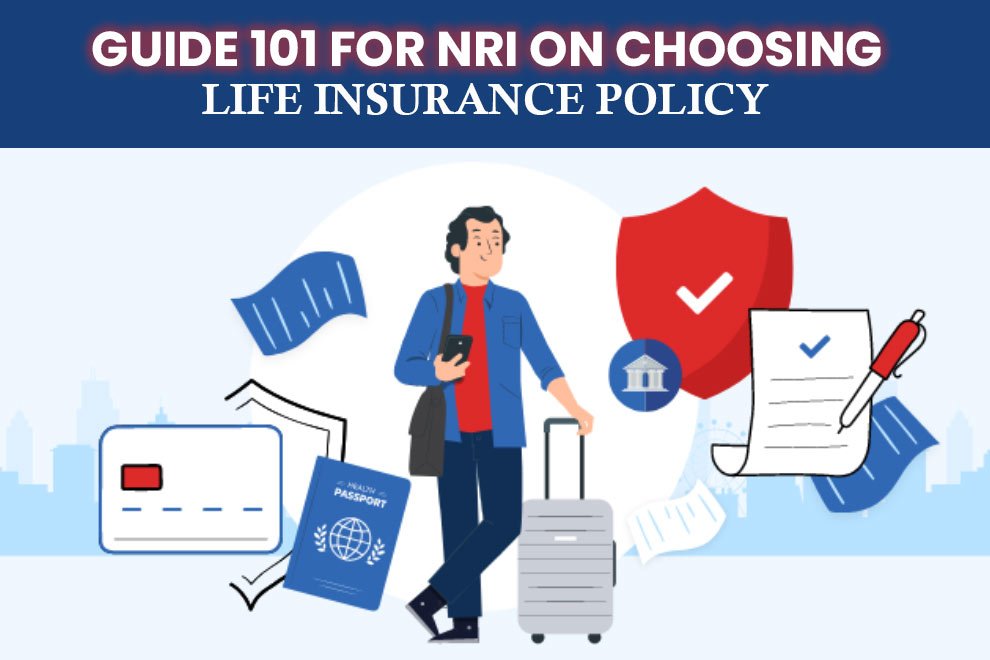NRIs, or non-resident Indians, are Indian citizens who live overseas either for study, better employment opportunities, further education or for any other personal reasons. If you live abroad, it becomes paramount that you must be looking for the best NRI plans that secure your financial future and your family back home. NRIs can greatly benefit from a life insurance policy because it provides financial stability for family members in the case of the policyholder’s untimely death.
Purchasing a life insurance plan as a non-resident Indian is somewhat similar to purchasing the plan as a resident. However, you have more options for securing the cover. Here’s how to select and purchase term life insurance:
1. Online Presence: Ensure that you can get adequate information about the plan, insurer, and service provided by the insurance company, via the insurer’s website. It would be best to find a company with clear information on the differences between their policies like whole life versus universal life insurance. Since their website will be your only direct contact with the insurer after customer service from your country of residency, it is important to choose an insurance company that has a strong online presence and an easy-to-navigate website. Check whether the insurer’s website allows you to purchase NRI Investment Plans and insurance policies and manage your coverage online.
2. Claim Settlement Ratio: Claim settlement ratio (CSR) is an important factor for life insurance firms, as it shows two extremely crucial performance criteria:
- Quality of insurer’s operations
- Speed of claim settlement
The ratio reveals how many claims the insurer could settle in the last financial year out of every 100 claim applications received. A good claim settlement percentage will mean your family can obtain speedy support in times of need. When you are choosing an insurance policy under your NRI Investment Plans, consider a CSR above 95% an excellent ratio, but the best insurers easily reach 98% presently.
3. Claim Settlement Process: The final test of any insurance company happens at the time of claim submission. The better the claim settlement process of the insurer the more comfortable your family will be at the moment of bereavement. However, how do you as an NRI get to know whether the company has the best claim settlement process without even submitting one? The first thing to observe is whether the process has been outlined thoroughly on the insurer’s website. This is likely the first place your family will look for processes and guidelines. Second, you should see if they may file the claim from a foreign country. This means that the insurer’s claim settlement process should be available online. Ultimately, you need to ensure that your dependents will not have to go from pillar to post to collect the death payout for which you have acquired a life insurance policy for them.
4. Persistency Ratio: The persistency ratio is a reality check on the insurer’s true value among its current customers. This ratio reveals how many clients remain with the insurer over time. Obviously, as a customer, you stick with brands that you are satisfied with.
The persistence ratio is frequently approximated for specified months (essentially the next policy year). For example, the 13th-month persistency ratio predicts premium receipts for the next policy year. The best insurers may have more than 80% as of the 13th month ratio. However, the ratio decreases as the number of years increases.
5. Limited Premium Payment Options: The top-term insurance companies use strategies to automate premium payments. The limited premium payment term option allows NRIs to pay the entire premium in a short period of time. This option is ideal for those NRIs who plan to return after a few years in a foreign country. For example, if you estimate your NRI stint to last only five years, you can buy an insurance NRI plans and set a five-year premium payment term. Your NRI term plan will continue to provide all of its benefits until the intended maturity date.
6. Premium Payment Options (Rupee & Foreign Currency Payments): Indian insurers are expected to conduct business in the Indian currency. However, you can remit straight to the insurer’s bank account if the insurer authorizes it. This facility is very useful for NRIs.
It is important to know that many life insurers do accept transactions for NRI Investment Plans in numerous foreign currencies. Also, you should know that to the extent you have paid premiums in foreign currency, the claim remittance is allowed in the foreign currency. For example, if you have paid 50% of the total premiums in USD, your nominee can repatriate 50% of the claim amount to that currency. That is, of course, if your nominee is also an NRI.
But which life insurance to choose from?
There are many types of life insurance policies and investment plans available for NRIs. Let us take a brief look at each of these types of policies.
Term Insurance: It is a type of life insurance policy that provides higher coverage for a reasonable premium amount. It provides financial protection for your family in the event of your untimely death during the policy period.
Unit-Linked Insurance Plans (ULIPs): ULIPs are a type of life insurance policy that provides both life insurance and investment benefits and is one of the preferred NRI plans. Under this plan, a portion of your premium is assigned to life cover, with the remainder invested in stock, debt, or balanced funds based on your investing objectives and risk tolerance.
Endowment plans: This includes insurance as well as a savings component. They provide a guaranteed sum assured coupled with a bonus or profit share that is declared by the insurance provider at the end of the policy term.
Money-back policies: In addition to the death benefit, money-back policies pay out in installments throughout the policy’s duration. These payments can help you achieve your financial objectives, such as paying for your child’s school or saving for retirement.
At last,
As an NRI, one of the most important financial management tasks you can do is to purchase a life insurance policy to secure your family’s future back home. A right life insurance policy is a part of your contingency plan that provides financial security for your family.
Also Read: Breathing Easier: A Guide to Choosing the Best Health Insurance Plan for COPD in India










